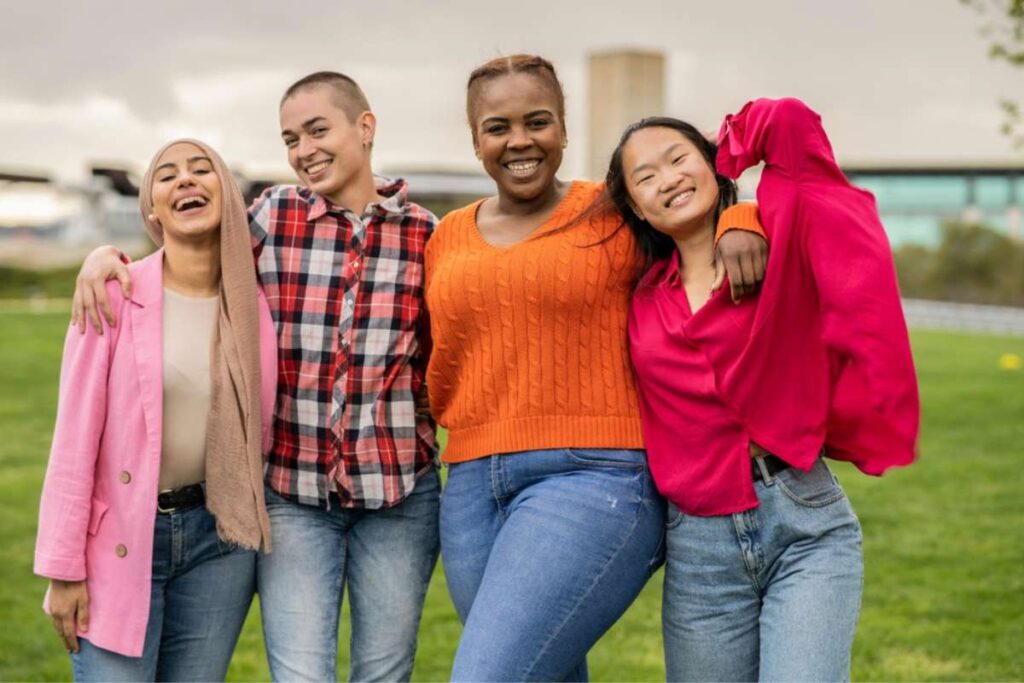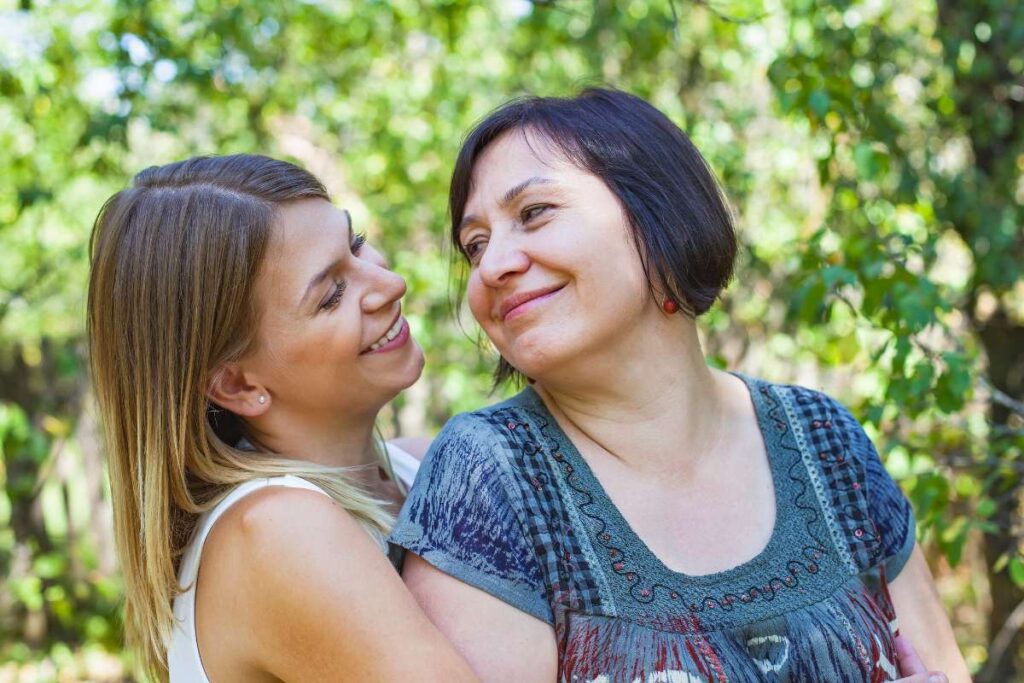We know there tends to be a trend toward negative perceptions of menopause, BUT it’s not a universal sentiment! You heard that right – you don’t have to accept or internalize the societal messaging about the menopause journey. Case in point: women+ who are in the gender identity and sexual orientation minority often have strengths that result in a more neutral or positive view of the transition and aging. It’s time to recognize the challenges but also the strength that can come for all women+ from a change the mindset about menopause.
LGBTQIA+ menopause mindset
As a member of the LGBTQIA+ community, your menopause mindset may be similar to heterosexual women in some ways and different in other aspects.
For example, LGBTQIA+ people face many of the same challenges as the non-LGBTQIA+ population during menopause, from unwelcome symptoms – mood swings, hot flashes, and weight gain – to managing their relationships.
However, it is important to note that everyone’s journey is unique. pausitive health often talks about how culture and race/ethnicity can impact both your mindset and symptoms during the menopause journey. Gender identity and sexual orientation can also be factors.
Here are some reasons your journey may be more positive than the non-LGBTQIA+ population. We’ll explore each in this article:
- Less regret about the end of menstruation.
- Better sex and less vaginal pain.
- More positive body image.
- Living your own definition of “beauty.”
- Being more accustomed to speaking up and speaking out.
Ready to chart your path? One you may not read about in the headlines? Let’s get started!
Less regret about the end of menstruation
There are empowering shifts that come with menopause, and LGBTQIA+ women are more likely to recognize them compared to their cisgender, heterosexual counterparts.
U.S. women in the sexual orientation and gender minority expressed less regret about the end of their menstrual cycles in a study in the Journal of Women’s Health. Why? For one, they were less likely to report negative feelings around their attractiveness or (loss of) fertility as they aged.
Having more fear about the physical changes often associated with aging correlated strongly with an individual’s feelings about the menopause journey.

Power of positivity
Individuals in LGBTQIA+ relationships sometimes report positive menopausal experiences at a greater rate than their cisgender, heterosexual counterparts.
One such example is better sex. As estrogen levels decline, many women+ experience vaginal dryness or dips in libido that can make sex less pleasurable or cause the other person to feel insecure about their body and physical attractiveness. But data shows that lesbian, bisexual, and pansexual perimenopausal and postmenopausal women report being sexually active more often than heterosexual women. That’s usually a win for relationship satisfaction.
No matter your life stage, how you feel about yourself and your circumstances impacts your relationships. In particular, high self-esteem in those with whom you interact and live has been shown to contribute strongly to relationship satisfaction. During menopause, that self-esteem and your overall mindset can have a profound impact on your journey. There is power in positivity. It can lead to fewer overall symptoms.
Better sex and less vaginal pain
Why the difference? For starters, LGBTQIA+ women report better sexual function. This includes less pain and vaginal dryness during sexual activity.
While mental health conditions such as depression and anxiety are common during the menopause journey and are associated with lower sexual function among cisgender, heterosexual women, that connection doesn’t appear for lesbian, bisexual, and pansexual women.
Positive body image
A more positive body image during menopause may be another reason for these differences. For everyone, the body will change as we age. But with less rigid perspectives around what they “should” look like, LGBTQIA+ individuals may be better equipped to embrace changing physiques and accept pleasure and intimacy from their partners without the baggage of society’s definition of what sexy is.
Lesbian women tend to have less severe symptoms and fewer issues with sexual well-being during the menopause journey than cis heterosexuals.
Living their own beauty
Some people may find joy in looking in a way that is aligned with certain narrowly defined beauty standards and marketing messages. Or having children, whether biological children they physically carry during pregnancy or children they foster or adopt. Or they try to stay (physically) forever young.
For example, physical attraction and fertility are commonly associated with “femininity” in many countries. Especially in Western cultures, beauty is also closely linked to youth.
However, none of that is what makes a person all of who they are (or even who they might actually want to be). They are choices.
And, as the saying goes, beauty is very much in the eye of the beholder and goes far beyond physical appearance. It looks different to different people and one’s own idea of beauty, as it may also be defined very differently as well.
Often, LGBTQIA+ individuals have defied societal expectations relative to gender identity and sexual orientation well before they embark on the menopause journey, even when it is premature (onset prior to age 40) or early (onset prior to age 45 but after age 40). Therefore, when this transition arrives, they may be more confident and feel more comfortable in their own skin than cisgender, heterosexual women, regardless of whether or not they fit with “traditional” or often stereotypical ideals and definitions of beauty in the U.S.
Additionally, many people associate strength, empathy, intuition, and wisdom with being “beautiful”—and these traits and ways of being often grow stronger as a person ages.
Whether or not you are a member of the LGBTQIA+ community, everyone entering this stage of life can embrace all of who they are, which is much greater than what could ever fit inside a societal box or stereotype.
Speaking up and out
Many women+ suffer in silence through challenging menopause symptoms.
They’re afraid to speak up, especially at work, for fear of what someone may think about their brain fog, hot flashes, or age.
LGBTQIA+ individuals often have to speak out and advocate for themselves more frequently than many others, due to many of society’s attitudes, stereotypes, ignorance, and discrimination. So, there may be greater experience and confidence in stepping forward to enact powerful and effective change.
And because their perspective may be more neutral or positive, the negative menopause narrative, which has historically been prevalent, may be more likely to evolve and to do so in a more sustainable way for everyone.
Additionally, with several celebrities now on the journey and talking about their experiences and Millenials, Gen Z, and Boomers increasingly unwilling to suffer in silence, menopause is having a moment in the spotlight, (including articles even in the Wall Street Journal!). It’s becoming more common for some progressive employers to even offer menopause-related benefits, and in the UK employers can become accredited as menopause-friendly workplaces.

A positive mindset doesn’t mean no challenges
Focusing on the positive aspects of the menopause journey for the LGBTQIA+ community is not meant to minimize the real challenges of the menopause journey faced by many women+.
It’s also important to note we’ve pulled studies about the LGBTQIA+ community, but most of the medical literature on the menopause journey centers on heterosexual women. Other experiences and perspectives have not been frequently studied or reported.
Even less information has been gathered with regard to the trans community. And if you are at the intersection of being a person of color and being in the minority relative to gender identity and/or sexual orientation, the data is even more scant.
Remember, every experience is unique.
Getting support from your doctor
All women+ may have difficulty getting adequate support from their doctor during the menopause journey.
Many doctors do not receive adequate training about menopause, and finding a doctor who understands your symptoms and concerns and presents all treatment options (hormonal and non-hormonal) can be challenging. And they usually do not have sufficient (or any) training regarding the unique care needs that may exist for members of the LGBTQIA+ community.
You may even experience medical gaslighting, including being given an incomplete picture of treatment options.
These experiences with medical professionals can negatively impact confidence in your ability to manage your symptoms.
It’s important to have a strong medical team on your side because the hormonal changes of the menopause transition can increase the risks of chronic conditions like heart disease, diabetes, hypertension, obesity, and depression.
Having a strong care team, and seeing them for preventive care, is critical to your health and well-being.
Help is available.
- To find a certified menopause doctor, search for one from The Menopause Society, formerly The North American Menopause Society or NAMS.
- OutCare Health lists LGBTQ+ affirming doctors and/or healthcare providers, who may or may not be menopause-certified.
- Human Rights Campaign (HRC) provides the Healthcare Equality Index to evaluate how well healthcare facilities deliver LGBTQ+ inclusion.
- Health Professionals Advancing LGBTQ+ Equality: GLMA Healthcare Directory
- CDC: LGBTQ+ Health Clinics by State and City (Archived)
- World Professional Association for Transgender Health (WPATH): Provider Directory
You need strong advocates on your team – from friends, partner(s), to healthcare professionals.
Though it may be difficult, it’s ok to search for someone with the expertise to provide the type of care you need during this stage of your life. That may sometimes mean walking away from the doctor you’ve seen for years, getting a second opinion, or adding another clinician to your team.
Now more than ever, it’s important to find someone who views your health holistically – mind, body, and spirit.
A vibrant life ahead
Although it’s not the norm in the U.S., some countries and cultures have a different perspective on the menopause journey. And women have greater status once they reach this stage of life. Age is seen as a positive and is honored.
Recognize your courage, innate talents, the skills you have gained, and the lessons you’ve learned that have gotten you to this point in life. A vibrant future awaits!
The choices we make today create the future that we are dreaming of.
~ Clare Josa
Erol, R. Y., & Orth, U. (2014). Development of self-esteem and relationship satisfaction in couples: Two longitudinal studies. Developmental Psychology, 50(9), 2291–2303. https://doi.org/10.1037/a0037370
Kruk M, Matsick J, Wardecker B. Feminity Concerns and Feelings About Menstruation Cessation Among Lesbian, Bisexual, and Heterosexual Women: Implications for Menopause. Journal of Women’s Health. Volume 30, Number 12, 2021. DOI: 10.1089/jwh.2020.8757
Women’s Feelings about Menopause Vary by Sexual Orientation | Institute on Aging University of Wisconsin-Madison
Midlife LGBTQ women report better sexual function vs. heterosexual women | Healio
Home | The Menopause Friendly Accreditation
Find a Menopause Practitioner | The Menopause Society, formerly The North American Menopause Society (NAMS)
The OutList LGBTQ+ Affirming Provider Directory | OutCare
How do healthcare facilities near you measure up on LGBTQ+ inclusion | Human Rights Campaign
Find a Provider: LGBTQ+ Healthcare Directory | Health Professionals Advancing LGBTQ+ Equality
Provider Directory Search | World Professional Association for Transgender Health
You may also like…

Menopause Pride: The LGBTQIA+ Experience And Where to Find Inclusive Doctors
Every menopause journey is unique. For LGBTQIA+ people there are positives and challenges, like health disparities. Learn how to have menopause pride by knowing what to expect.

7 Ways to Strengthen LGBTQIA+ Relationships During Menopause
There are unique challenges for LGBTQ+ women during menopause, and it can impact your relationship(s). Learn how to strengthen them.

7 Proven Ways to Positively Change Your Mindset About Menopause
Accepting and managing all the changes that come with menopause can be challenging, but changing your mindset to a positive one can help.

